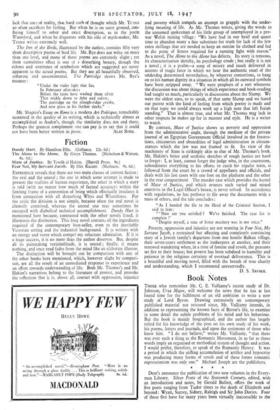Fiction
Dandy Hart. By Hamilton Ellis. (Gollancz. 12s. 6d.) The Alone to the Alone. By Gwyn Thomas. (Nicholson & Watson.
8s. 6d.) Maze of Justice. By Tevvfik el Hakim. (Tlarvill Press. 9s.)
Fear Not, My Servant Jacob. By Illes Rae-zit. (Methuen. 9s. 6d.) EXPERIENCE reveals that there are two main classes of current fiction : the real and the unreal ; the one in which some attempt is made to present the realities of human experience, the other in which a story is told (with no matter how much of factual accuracy) within the limiting frame of a convention of being which effectually insulates it from connection with all disturbing Whys and Wherefores. For the critic the division is not simple, because often the real novel is clumsily contrived, whereas the unreal one may sometimes be executed with diabolical technical accomplishment. Dandy Hart is mentioned here because, contrasted with the other novels listed, it illustrates the distinction. This long novel contains all the ingredients required of the contemporary best-seller, even to the inevitable Victorian setting and the industrial background. It is written with an energy and verve which compel my reluctant admiration. If it is a huge success, it is no more than the author deserves. But, despite all its painstaking verisimilitude, it is unreal ; finally, it means nothing, and once read fades from the mind like an elaborate illusion.
The distinction will be brought out by comparison with any of the other books here mentioned, which, however slight by compari- son, are all the result of an unmediated response to experience and an effort towards understanding of life. Both Mr. Thomas's and Mr. Hakim's narratives belong to the literature of protest, and provoke the reflection that it is', above all, contact with oppression, injustice and poverty which compels an attempt to grapple with the under- lying meaning of life. As Mr. Thomas writes, giving the words to the unnamed spokesman of his little group of unemployed in a pre- war Welsh mining village : "We have had in our brief and queer time to abandon many a fine substitute for truth for lack of the few extra shillings that are needed to keep an outsize he clothed and fed to the point of fitness required for a running fight with reason." As a novel, The Alone to the Alone has defects. Its story is tenuous, its characterisation sketchy, its psychology crude ; but really it is not a novel ; it is a psalm—a song of misery and insult delivered in accents of tragic farce in which we hear the authentic snarl of the underdog determined nevertheless, by whatever contortions, to hang on to his human dignity in a situation in which all its outward symbols have been stripped away. " We were prophets of a sort whenever the discussion was about things of which experience and book-reading had taught us much, particularly in discussions about the Slump. We were the oldest sons, so to speak, of that same Slump and we hated our parent with the kind of feeling from which poetry is- made and on that topic we could always work up a high note that left Isaiah standing." That is almost true, and what Mr. Thomas mai lack in other respects he makes up for in manner and style. He is a writer to watch.
By contrast, Maze of Justice shows • us poverty and oppression from the administrative angle, through the medium of the private journal of an Egyptian Government Official involved in the frustra- tions, chicaneries and absurdities of legal administration in circum- stances which the law was not framed to fit. Its view of the machinery of State is strikingly akin to that of Mr. Thomas's book. Mr. Hakim's bitter and sardonic sketches of rough justice are hard to forget : I, at least, cannot forget the judge who, in the courtroom, subordinates everything to his efforts to catch his regular train, is followed from the court by a crowd of appellants and officials, and deals with his last cases with one foot on the platform and the other in the rear compartment. The murder case which provides the kernel of Maze of Justice, and which arouses such varied and mixed emotions in the Legal Officer's breast, is never solved. In accordance with regulations, he has perforce to file away the documents with a mass of others, and the tale concludes :
" As I handed the file to the Head of the Criminal Section, I said to him:
" ' Now are you satisfied ? We've finished. The case list is complete !' " Despite myself, a tone of bitter mockery was in my voice."
Poverty, oppression and injustice are not wanting in Fear Not, My Servant Jacob, a restrained but affecting and completely convincing story of a Jewish family's departure from one hostile Balkan village, their seven-years settlement as the innkeepers at another, and their renewed wandering when, in a time of famine and revolt, the peasants set fire to their house; but protest has been subdued to humility and patience in the religious certainty of eventual deliverance. This is a beautiful and moving novel, filled with the breath of true charity and understanding, which I recommend unreservedly. D. S. SAVAGE.


































 Previous page
Previous page